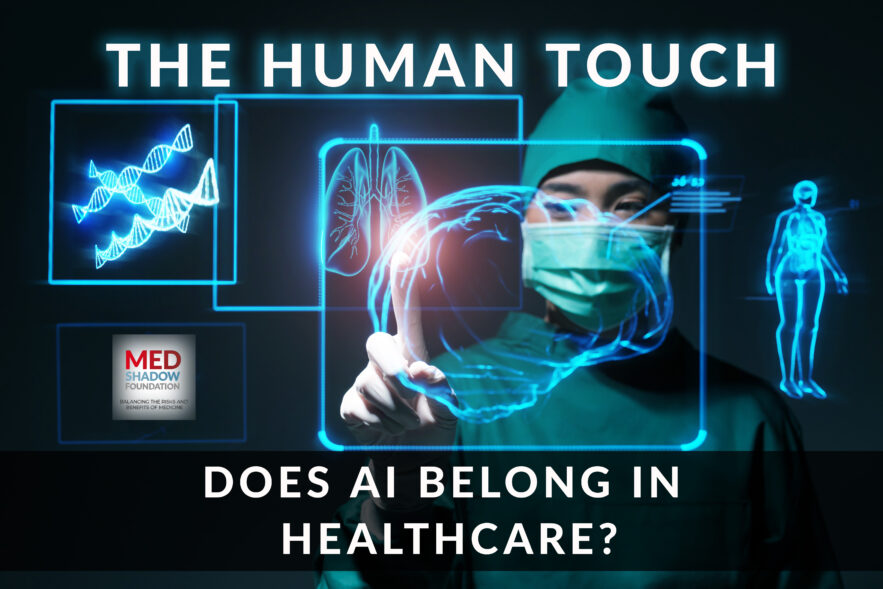Technology is important. It has become a central part of nearly anything we do. From communicating with friends and loved ones, to advancing your education, there are so many uses for the marvels of the modern world. And, for the most part, they make things much easier, faster, and more accessible. But what is their role in healthcare?
Will AI become a helpful tool in the healthcare industry? Or can it ever truly replace the human interaction necessary in many aspects of the field?
AI’s Role in Healthcare
As a nonprofit focused on educating all about the side effects of medication, we at MedShadow appreciate technologies, of course. But we also have a unique viewpoint from which to understand AI’s potential roles in healthcare.
For one thing, technology is the primary way we can spread our informative, independent journalism. In order to inform readers, we need the internet, email, our browsers, and newsletters. (Shameless plug alert: If you haven’t subscribed yet to our newsletter, now’s a great time to do so!)
We use technology to find the important research done, the in-depth and unbiased resources, free from pharmaceutical influence, and a vast amount of tools to help us to keep you informed. We devote time, again thanks to technology, to research our sources, ensuring they are free from any conflicts of interest, free from pharmaceutical influence, and without pharmaceutical funding or backing.
A Limit to Technological Advances
As hard as it tries, science has not quite caught up to science fiction with the creation and continued development of artificial intelligence (AI). Personally, I think that’s a good thing. While there seems to be areas AI can clearly assist in, its flaws, ability to falsify information it cannot find, or errors simply make it something we cannot fully trust just yet, especially with matters as serious as medical care.
It may be some time, or maybe never at all, until AI’s abilities catch up to an actual human capacity. Yes, it can be faster. Yes, it can gather massive amounts of information. But, being a human is a very complex and unique thing. I’m not sure technology will ever truly find a way to replicate it fully.
Health and Wellness Is a Human Condition
Health and wellness is … well, human. Your health is part of being a person in a technical sense, as well as an emotional one. AI isn’t likely to catch a cold (maybe a virus, but that’s another story). AI isn’t likely to suffer a long, painful death due to cancer. It probably won’t need loving palliative care in a hospice facility. It won’t need you to hold its hand or help it to the bathroom. It may simulate or guess at your feelings, but it does not have any (at least not yet) of its own. It is not now, nor likely ever will be, human.
But we are. We are incredibly dedicated to our mission at MedShadow, not simply to drive site traffic numbers for the sake of numbers, but to reach and inform our readers. We don’t do it to seek fame and fortune, or aim to rack up crystal awards. We do it because we are human. You are human. And our human nature unites us all. We do it because we care. We do it because we know side effects have an incredible impact on your life, and may even take your life. And, we know that educating yourself, empowering yourself, and advocating for yourself can be the best medicine in finding quality health and wellness.
A Place for AI in Healthcare
I’m not against the use of AI. I’m not against it existing and even being helpful. It’s already made advances in radiology for pediatrics, mammograms, and colorectal cancer screening.
However, I think that it has limitations. And, I think it likely always will. To be human means more than programming. It is more than memorizing strings of coding.
I can see value in things like tracking your symptoms or medication. Perhaps AI will be helpful in providing analysis for a certain medication working or treatment plan’s effectiveness. But, there are still going to be things a computer cannot do. And, at present levels, the AI world is still coming up short. It is full of holes, complications, errors, and straight up misinformation. It is not ready yet for the medical world, certainly not alone without human assistance.
We at MedShadow have opted to shy away from these tools until they can become a trusted and reliable resource. It will also be a technology we approach with caution in the future, as AI can likely NOT be truly free of conflicts of interest. Depending on its programming, who developed its software, and how it is used, many “biases” are likely to arise in our world of capitalism.
Keeping Healthcare Human
When it comes to your health, I certainly would prefer a human to have involvement in my choices over a machine alone. I’d also prefer that human to be me, making educating selections based not only on data but emotion. I also would want to interact with another trained and educated human (ideally a real, live doctor) when making tough decisions about my health.
Far beyond medication interactions, calculated probabilities for success, and recommendations based on past choices of others, I’d want to be considered as a human with experiences and emotions a “bot” cannot “comprehend,” in that there are other important factors, far beyond statistics, that weigh on my decisions.
For example, my emotional attachments, my personal views, my religious beliefs, the impact on my children … These are all things I weigh heavily in my medical choices. My stances are unique, and likely far from most patients’ values. But, I’m not sure how a computer would know that.
Sure, AI can rattle off what 99 out of 100 people chose to do, show you statistical results of some trials, and maybe even list pros and cons. But a bot does not know that my youngest child is more sensitive and emotional than my eldest. My bot does not know our family’s real history of mental illness, unless it was properly diagnosed (which it was most certainly not).
A bot cannot understand the pain and agony of losing a mother to a disease I’m prone to also have someday. AI cannot compute the suffering one has endured watching multiple generations in her family, very close friends, and neighbors pass away. A bot does not comprehend the mental and emotional toll that takes on a human, influencing how they’ll choose to handle their own care.
I’ve watched a very good friend of mine struggling to find a diagnosis. I watched her seek doctor after doctor who ignored her concerning symptoms. I hurt along with her as she struggled to find a solution. I cried with her when she was told she had breast cancer. I cried harder with her when they said it would only be a matter of months.
I watched her have to feel shame and embarrassment when she could no longer control her bodily functions. I changed her diapers. I wiped the dribble from her chin. I fed her soup in her bed. I watched as she dwindled away to nothing. I was there for her last night on this earth. And there are few things as painful as that process.
Unfortunately, it was not long after that crushing emotional process that I had to watch my own mother go through the same problems. From diagnosis to death, she suffered a total of only 18 months. I am grateful her pain was short-lived. I am sad that we all have to move on without her.
I cannot even put into words what watching your own mother suffering makes you feel. Painful is not even a strong enough word. It crushes your soul. You feel helpless, confused, angry, lost… It is a mix of emotions that, while time may dull, will never truly end.
I am not sure how a computer puts that into perspective. I am not sure how an AI bot would know that many of these experiences, which have formed me into the person I am today, will impact my choice if and when I receive a similar diagnosis. There are few words that can put it into perspective, and I am certain there are even fewer computer codes that could.
I know that it is far more these personal interactions that have helped me form my future choices. Not only can a computer not understand that, but most humans cannot either. Every person is unique, having had a completely different path through life, filled with completely different experiences. It would take me more than 40 years just to put all that into words, forget coding it, too!
Is there a place for AI in healthcare? Yes. I am sure, with time, it will serve many clinical processes and come to be an asset. Do I think AI can replace humans in understanding our own, very personal, medical choices? No. Some things are better left to people.






